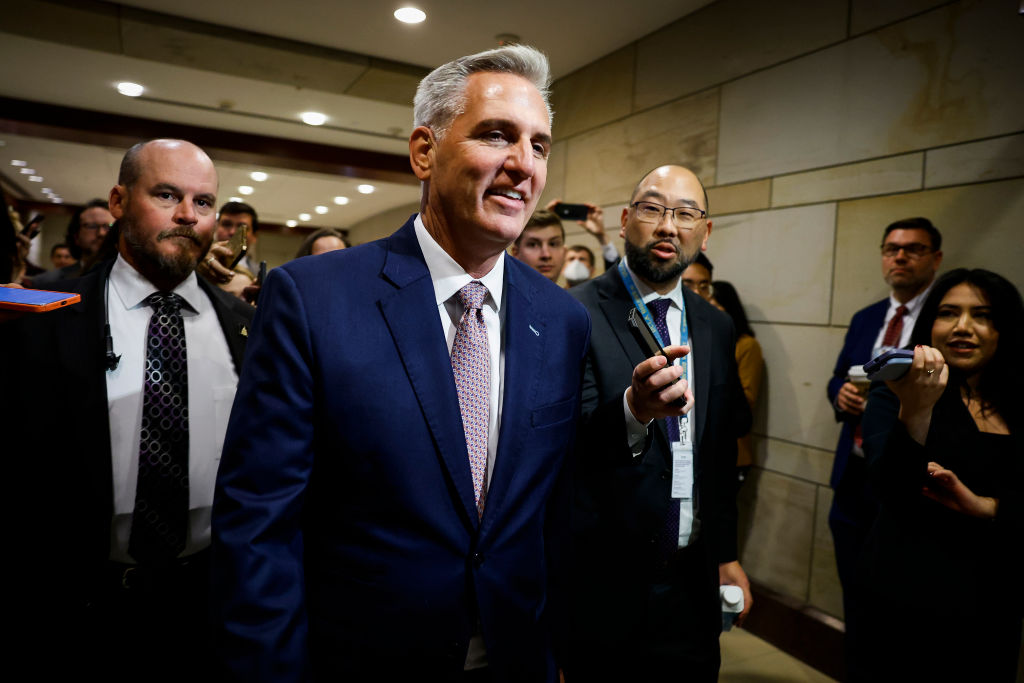
After failing to deliver a red wave in the midterms last week, House Republicans will on Tuesday elect their leader to govern a much smaller than expected majority.
House Republicans met on Monday in a forum to welcome new members and to discuss the future of the party leadership. Rep. Kevin McCarthy, the House minority leader and frontrunner in the speakership bid, delivered his pitch to the Republican conference.
It was a “spirited conversation about the direction of the conference, where we go from here,” Rep. Jim Banks, a Republican from Indiana who himself is vying to become the House Majority Whip, told reporters after the meeting. “We have strong Republican leadership ready to hit the ground running, ready to go on January 3 when we take back the House.”
Read More: How Democrats Defied History in the Midterms—And What It Means for 2024
As of Monday evening, Republicans still hadn’t clinched control of the House—the Associated Press has called 212 seats for the GOP, and 218 are needed to win. But Republicans are widely expected to take the Speaker’s gavel in 2023, albeit with a far slimmer majority than some had predicted.
With a tight margin, dissent from the far right of the party could carry significant power. Reports ahead of the Monday meeting said the House Freedom Caucus, a coalition of some of the most conservative Republicans in Congress, may challenge McCarthy for the speakership. Arizona Rep. Andy Biggs, the caucus’ former chair, announced he will run against McCarthy on Newsmax on Monday evening.
“It’s going to be tough,” Biggs said. “This is not just about Kevin, I think it’s about institutional direction and trajectory, and that’s where we’re going to see if we have enough people who agree that we need to change the trajectory of this place and open it up so people can actually represent their constituency in a more open and transparent manner.”
Rep. Matt Gaetz, a Republican from Florida, said he does not back McCarthy’s bid for Speaker. “I think you’ll see a critical mass say that we want to turn the page, we want new leadership, we want fresh faces and new ideas,” he told reporters after the Monday forum. “I can tell you as I stand here right now that Kevin McCarthy does not have 218 votes to become speaker. I don’t think he has 200.”
Read more: Kevin McCarthy Might Actually Be Good At This
But other members of the far-right flank have aligned themselves with McCarthy and say they will work to bring their colleagues on board. Rep. Marjorie Taylor Greene of Georgia told reporters on Monday that she supported party unity and backed McCarthy. “If we don’t unify behind Kevin McCarthy, we’re opening up the door for the Democrats to be able to recruit some of our Republicans, and they may only need one or two, since we don’t know what we will have in the majority,” Greene said, “and I will not allow that to happen.”
McCarthy will only need to secure a majority of the House Republican conference to win Tuesday’s leadership vote. But he’ll need to garner 218 votes in the Speaker election in January, and it’s not yet clear if he has all the votes he’ll need. Some Republicans, including Gaetz and Rep. Chip Roy of Texas, have called on the party to delay voting until all House races have been called.
The jostling over the speakership is just one indication of the battles to come among the party, where with a slim majority, every vote will matter.
Correction, November 14
The original version of this story misidentified Rep. Dan Bishop as one of the Republican Congressmen who spoke to reporters on Monday. Rep. Bishop was not present.
More Must-Reads from TIME
- Cybersecurity Experts Are Sounding the Alarm on DOGE
- Meet the 2025 Women of the Year
- The Harsh Truth About Disability Inclusion
- Why Do More Young Adults Have Cancer?
- Colman Domingo Leads With Radical Love
- How to Get Better at Doing Things Alone
- Michelle Zauner Stares Down the Darkness
Write to Jasmine Aguilera at jasmine.aguilera@time.com